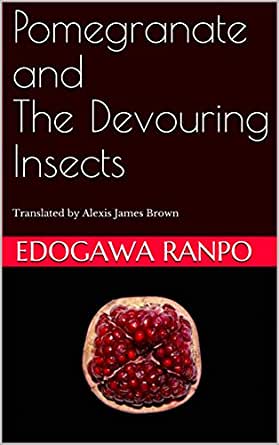 By EDOGAWA RANPO (Zakuro Books; 2019)
By EDOGAWA RANPO (Zakuro Books; 2019)
Two previously untranslated stories by Edogawa Ranpo, Japan’s answer to Edgar Allan Poe, make up this 84 page e-text. “Pomegranate,” initially published in 1934, and “The Devouring Insects,” from 1929, represent the two extremes of Ranpo’s early fiction (of which “Pomegranate” marked the endpoint, as its poor reception reportedly inspired him to turn his attention to juvenile novels and nonfiction for the remainder of his career). This means the first is a straight detective story while the second reminds us quite forcefully that Ranpo was the father of Japan’s “ero-guro” (erotic-grotesque nonsense) genre.
In “Pomegranate” a police detective relates the particulars of the Case of the Acid Murderer, involving the discovery of a man’s acid-scarred corpse and the investigation into said man’s death. This person, the detective learns, was Shuichi Kotono, the owner of a confectionary store that specialized in rice cakes. Kotono was in direct competition with a like-minded establishment in the same neighborhood, owned by one Man’emon–who, to add further insult, married the woman Kotono loved. Is Man’emon the culprit in the acid attack? It would certainly seem so, although of course the case turns out to be far more layered than it seems initially—and also later, when the protagonist proclaims it “solved” only to find himself faced with a further unexpected wrinkle in the final ten pages.
The story overall is a strong one, with prose that’s thoroughly redolent of early twentieth century pulp fiction, down to the leering yet restrained descriptions (sensual detail is nonexistent, albeit very strongly implied). The narrative admittedly feels a bit derivative, but Ranpo is quite upfront about that, with “The Purloined Letter” by Edgar Allan Poe and “Trent’s Last Case” by E.C. Bentley both explicitly referenced; I’m not entirely sure this excuses Ranpo’s borrowings, but he does at least acknowledge them.
“The Devouring Insects” is much simpler. It’s about Masaki Aizou, a psychotically introverted loner who becomes romantically obsessed with Fuyuo Kinoshita, a beautiful young actress and former schoolmate. Unfortunately she’s taken up with Ikeuchi, another former classmate who happens to be Masaki’s only friend. Masaki takes to shadowing them and surreptitiously watching their lovemaking. Eventually he snaps entirely, murdering Fuyuo and taking her corpse back to his home, where it steadily decays. Masaki attempts to stop the decomposition, which Ranpo describes in loving detail, but when that fails he learns to live with it, consummating his love with a grotesque act of (implied) necrophilia.
The translator of these tales was the London-based Alexis Brown, who anglicized several Ranpo tales in 2019-20 (including THE SPIDER MAN and THE HUNTER OF THE GROTESQUE). Here, as in those volumes, he does a superlative job, turning out a readable and erudite book that renders the quintessentially Asiatic flavor of Ranpo’s writing in English. What Brown’s translations don’t do is make these tales any less dated in their narrative construction or overall attitude, but then dated content, I’d say, is an inevitability with early 20th century Japanese mystery fiction.
